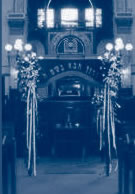|
SEDRA : RE'EH - Hertz Chumash p. 799 Deuteronomy
Chap.11 verse 26
This week's Serda is generously sponsored by Yossi Harel
SYNOPSIS:
Moses informed the Children of Israel that there is a choice
between receiving G-d's blessings for observing His commandments
or suffering His curse for rejecting His laws. A ceremony
would be held on Mounts Gerizim and Eval, immediately after
entering Eretz Yisrael, during which the consequences of the
blessing and the curse would be pronounced.
Moses then turned to the exposition of a number of religious,
civil, and social laws which were to regulate the life of
the nation in the Promised Land. He dealt first with the principles
of centralised worship, which were directed against the idolatrous
practice of individual worship at any site. All sacrifices
were to be brought only to the place chosen by G-d. Those
portions of offerings permitted to the lay worshipper were
to be eaten there. However, an animal intended for ordinary
consumption rather than for a sacrifice could be slaughtered
and eaten anywhere, provided its blood was not consumed.
The Bnei Yisrael were warned not to imitate the hideous rites
of the Canaanites, such as sacrificing living children to
their gods. The false prophet who attempted to entice them
to worship idols was to be put to death. All the inhabitants
of a city who, after having been investigated, were convicted
of idol worship, were also to be put to death, and the city
(called an Ir Hanidachat) was to be totally destroyed by fire.
Self infliction of wounds on the body or head as a sign of
mourning is prohibited.
As a holy people, Israelites are to refrain from eating anything
abominable. Moses, therefore, reviewed the dietary laws already
revealed at Sinai. He said that a second tithe (Mas'aser Sheni)
consisting of a tenth of one's annual produce of the soil
including grain, wine, and oil, was to be brought by every
Jewish man to the Sanctuary and consumed by him there. Any
Israelite who lived too far away from the Sanctuary to bring
the Ma'aser Sheni there, could bring its monetary value instead,
purchase food there with the money, and enjoy a festive meal
with his family and the Levi'im. At the end of every 3rd and
6th year of the Shemitta cycle, this tenth was to be given
to the poor (Ma'aser Ani) in one's town or city rather than
brought to the Sanctuary.
At the end of every seventh (Shemitta) year, during which
the land is to remain fallow, a creditor is to release his
fellow Jews form any loans which may be due. Yet, this should
not discourage anyone from lending money to the needy, for
such acts of kindness will be amply rewarded by G-d.
In addition, a Hebrew bondsman who had been sold into servitude
was to be freed at the beginning of the seventh year, and
liberally assisted with material means to enable him to make
a fresh start in life. If the bondsman should choose to remain
in his master's service, his ear was to be pierced, as a sign
that he selected servitude rather than freedom, contrary to
G-d's wishes.
In amplifying the laws of the Feasts of Pesach, Shavuot, and
Succot, Moses emphasised that every male Israelite was to
make a pilgrimage three times a year to the Sanctuary, bringing
with him sacrifices, each person according to his means. This
last section of the Sedra forms part of the regular Torah
reading on our Chagim.
HAPHTORAH HERTZ CHUMASH P 818 Isaiah Chap 54 verse 11
This is the third of the Haphtorot of Consolation following
Tish'a B'av taken from the prophecies of Isaiah. (It is also
"Bar Mitzvah boys' delight" being the shortest haphtorah
in the annual cycle).
TELL ME RABBI ..... THE MONTH OF ELLUL
SHOFAR: From the first of Ellul we customarily blow 3 Shofar
blasts (Tekiah, Shevarim, Teruah) daily at the conclusion
of the Morning Service. On 1st Ellul Moses ascended Mt Sinai
for the second time amidst the blast of the Shofar to pray
for Israel's forgiveness for worshipping the Golden Calf.
This would inaugurate a mood of penitence.
YOM TOV CARDS ! The Shulchan Aruch points our that when writing
a letter during Ellul one should wish the addressee a Ketivah
v'chatimah Tovah - to be and Inscribed and Sealed for Good.
From the desire to fulfil the beautiful thought implied in
this concept arose the idea to send cards. One is thus automatically
put in a position where it is appropriate to fulfil this custom.
BACK TO SHABBAT SHALOM
TABLE
|








